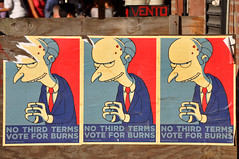
(An interview of Meg Hillier with Blood & Property)
Blood and Property: How does your job as a minister fit in with your job as a constituency MP?
Meg Hiller: The difference is that I can’t speak about issues in the chamber of the House of Commons that aren’t related to my ministerial portfolio or department.
So I can’t ask questions in the House on certain issues but that’s not necessarily a problem because there are other ways I can raise them. For example, on the Crown Estate proposals, which is a big issue in the constituency, threatening to sell off its property in Victoria Park, I’m working very closely with the other MPs involved who are not ministers. We’re working together but they’re speaking and I’m supporting.
MPs who are ministers “can’t speak” on local issues. We elect them into a position of local responsibility, and they get promoted into silence. This is really, really stupid.
On the other side of my local ward is Denny de la Haye, an Independent candidate who is standing on a platform more like Athenian democracy. He intends, should he be elected into parliament, to vote on any issues put in front of him based on what local people decide, via his website. There are a number of issues he feels strongly enough about to exclude from this system. This appears to be much like the swedish “Demoex” political party, but – beyond reading their wikipedia page – I don’t know very much about them.
The downside of such a system is that part of the social contract of the elected officials is to make unpopular decisions that are for the good of the future, rather than suffer “tyranny of the majority” type problems, but the political climate is so horribly poisonous right now, with the average person’s trust in MPs trashed by allegation upon allegation upon scandal upon duck-house, that the idea of a more direct line into government could reinforce the idea that they do indeed work for us.
The ward I live in is fairly safe for Labour, so it’s possibly a doomed attempt on his part, and I need to research his opponents more, but it’s an interesting experiment.




I hear you. My parents have a conflict between voting for their current local MP, who is a LibDem and outstandingly good at dealing with local issues, or voting for the party they would choose to represent them in government, which is not the LibDems.
“part of the social contract of the elected officials is to make unpopular decisions that are for the good of the future”
As long as the future is defined as “before the next election”. One of my biggest gripes with the current system is that it encourages the government to plan short term and opt for the quick fix, rather than go for the longer term action that is more likely to benefit the country but not the party.
The “referendum on every vote” approach is an interesting one – it remains to be seen whether it would result in the MP following the herd, or whether only the interested minority would bother to vote. I think, on the whole, I would prefer to just select the candidate that I feel best represents my views, and let them get on with it, but this does pre-suppose that any of them even come close, and doesn’t allow for the effect of the party whip system.
Cwol: The party whip is the thing that’s really driven me into running on this platform, I think. I’ve been a political campaigner on a range of issues over the last 15 years, and coincidentally have lived in a range of safe seats. My impression of politicians formed over those years has been that they uniformly couldn’t care less what the people in their constituency wanted. Once I found out about how the ‘career politician’ thing works, with a safe seat and a ministerial position as the end point, I realised why that might be. So, I decided that before I could get my voice heard on all the other issues I cared about, first I needed to fix our political system. Bit of a big goal, but I’m going to try anyway.
Oh, regarding the fact that we live in a safe seat… this is one of those ideas that’s either going to grab people’s attention, or not. The number of people I’ve canvassed out and about in Hackney who’ve said “Oh my god, I’ve always thought it should work like this” is really encouraging me to believe that it’s possible this idea could have wings. Because I’m offering an alternative to the whole system, rather than just a different party position, I think whether the seat is safe or not makes little difference to whether I can win or not – it’s all on the idea.
My leaflets should start arriving in all Hackney households over the course of this week, so hopefully I’ll get a feel from this week’s webstats as to how many people are drawn to the idea.